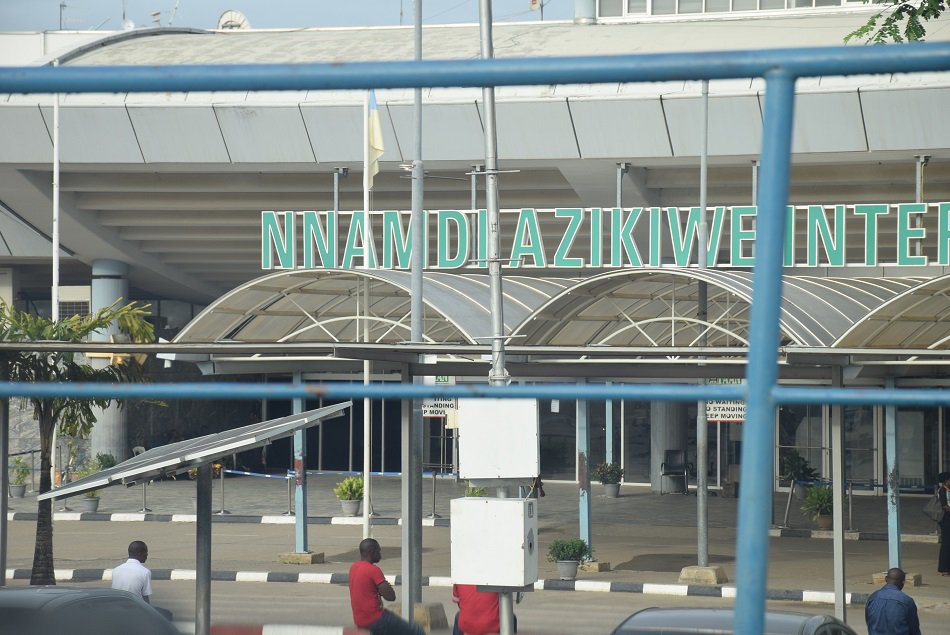- Abuja Airport N61.2b Terminal Opens February 2018
All things being equal, the Nnamdi Azikiwe International Airport’s (NAIA) new terminal in Abuja will open for operations February next year.
The terminal, built at the estimated cost of N61.2 billion ($200 million) is a partnership between the Nigerian government and the China Civil Engineering Construction Corporation (CCECC).
The new terminal, according to state officials, is to offer befitting service to airport users that are visiting the Federal Capital and accommodate new traffic on account of the second runway already penciled for 2018.
The National Assembly joint committee on aviation, on an oversight function Tuesday, was impressed with the level of work at the facility, concluding that it is 80 per cent ready.
While the construction company, CCECC, said the terminal will be ready February barring shortage in power and water supply, the committee urged the handlers to ensure all necessary equipment are in place before the facility officially open for use.
It will be recalled that the new terminal is one of the four terminals for construction in the N153 billion ($500 million) loan deal between the Federal Government and CCECC in July 2014. However, delay in the payment of counterpart funding by Nigeria has stalled progress of the work with delay in completion date.
Chairman, Senate Committee on Aviation and leader of the team, Adamu Aliero, said the joint committee is working with the Ministry of Aviation on ways to secure funds to ensure the terminal is delivered with all equipment in place.
On the CCECC Project Manager’s concern over power and water supply shortage, Aliero assured that the ministry of aviation is already aware of the challenge and working to resolve it.
“And once they bring it to the notice of the legislature, we will do the needful and give necessary support because we need this terminal to be put to use immediately after completion.
“There is no point having a terminal without water and electricity. The existing power and water supply is not adequate to accommodate the terminal without an upgrade.”
“The terminal would be completed and commissioned before the end of next year. It is already 80 per cent ready. What is left to be done is just the finishing and the equipment are already on ground. The project manager said the control tower and fire station need to be relocated. If the fire station and control tower are relocated, maybe we would commission the facility earlier than the end of next year,” Aliero said.
The chairman added that there is no going back on the construction of a second runway for the Abuja Airport “because of the increasing passenger traffic and capacity for the airport.”
He said the Abuja aerodrome is the only major airport in Nigeria without a second runway, adding that the National Assembly had already made provision for the runway in the 2018 Appropriation Bill.
He said all that is left is for the ministry of aviation to make arrangement for the procurement and award for the contract.
“Lagos, Kaduna, Kano and Port Harcourt all have second runway. Abuja being the federal capital territory deserves a second runway with the attendant passenger inflow and number of flights coming into the airport.
“We do not need a situation where we have to wait or divert to Kaduna International Airport again with the horrendous experience before building a second runway.
“This is why the National Assembly has approved the construction of second runway for Abuja and luckily the ministry is working to ensure that the procurement and award of contract is done before the end of this year and if it is awarded there would be enough funding for next year.”
Earlier, Project Manager, Kelvin Lee, said unless there is an upgrade of existing power and water supply, the completion date will be delayed.
Lee said it would be of no value to complete a terminal of such magnitude without adequate power and water supply.
He urged government to facilitate funding to accelerate the provision of support equipment that would enable the company deliver the terminal before the end of next year.
Lee said the company was working within its scope to complete the terminal, but will require government to relocate the control tower and fire station that currently pose an obstacle to some sections of the new terminal.
Part of the sections of Abuja Airport visited by the committee include Wing D , section of the terminal, the resurfaced runway, the new Chinese International terminal, the flight decoding laboratory of the Accident Investigation Bureau (AIB) and proposed headquarters of the Nigerian Civil Aviation Authority ( NCAA).

 Naira4 weeks ago
Naira4 weeks ago


 Naira4 weeks ago
Naira4 weeks ago


 Naira3 weeks ago
Naira3 weeks ago


 News4 weeks ago
News4 weeks ago
 Travel4 weeks ago
Travel4 weeks ago




 Naira3 weeks ago
Naira3 weeks ago


 Jobs3 weeks ago
Jobs3 weeks ago
 Naira3 weeks ago
Naira3 weeks ago






















